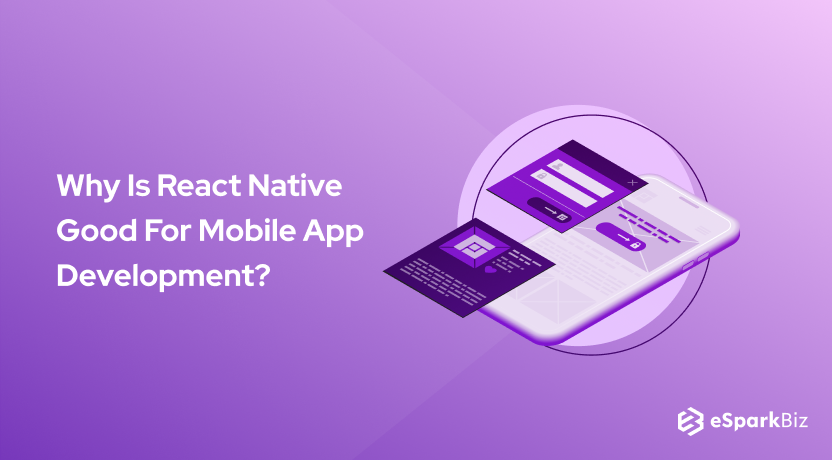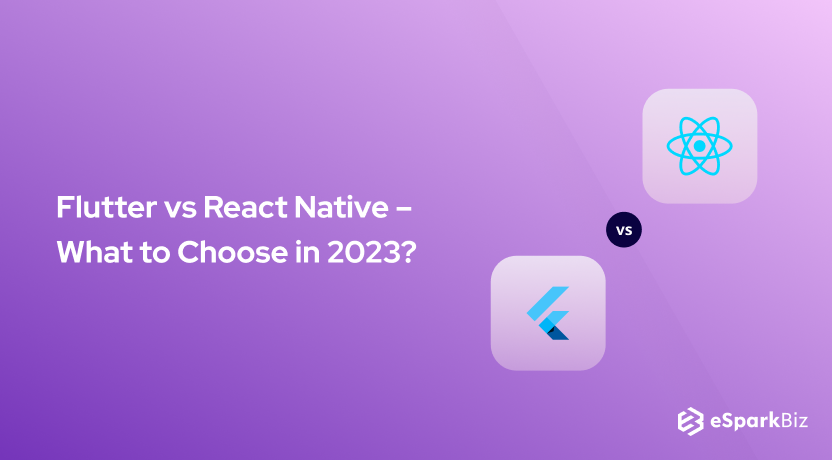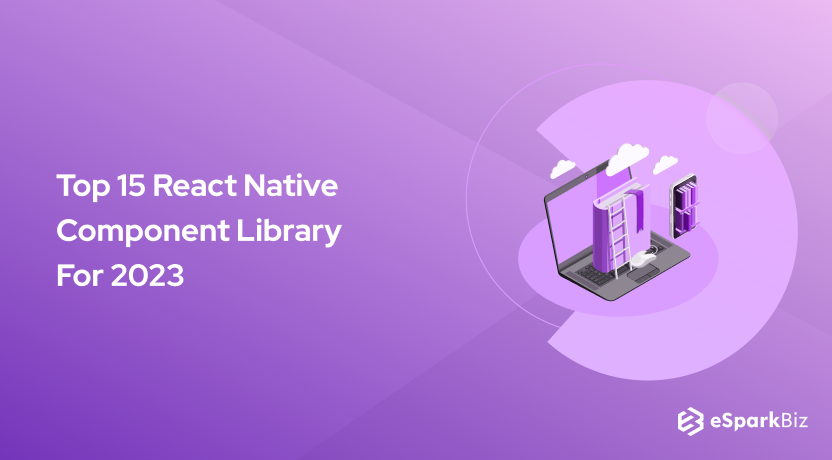We can’t imagine our life without phones. We have never realized how dependent our life has become just with this small innovation supporting so many different applications. Today, we will discuss why Is React Native Good For Mobile App Development.
Cross-platform programming helps in reducing the development costs and saves time & resources by using the program codes in different platforms. The React-Native environment development is in growing demand for building mobile applications.
But why to use React-Native for Cross-platform development? It’s because React-Native is an open source platform for developing native mobile applications.
The key benefits of React Native apps are that they give fast usage experience and smoother feel. React Native Apps Examples are proof of that.
Their features are equivalent to any native application developed using the old style for instance, iOS technologies like Objective-C and swift are used for development.
Based on a research, by 2023, mobile apps are estimated to generate revenue of $935 billion, through in-app advertising and app stores.
Keeping above mentioned things in mind, let’s just check, Is React Native Good?
Vast Community
React Native is an open-source framework for mobile application development which ensures that all data relating to this development is accessible to all and is available free of charge to anyone in the React Native network.
It’s a community-driven technology which in turn has great benefits. For instance, if any problems related to developing a React Native app are encountered, you can check for advice or hints from community experts. You can even find resources online as well.
Acknowledgement of the code written by the developer is yet another advantage of working with an open platform as developers can exchange their experience and create portfolios that inspire other developers to write better code.
This will clear your doubts about Is React Native Good For Mobile App Development.
For ex: After discovering something new when working with React-Native, developers may share their experience with the GitHub version control system or React-Native Group and get reviews and even collaborate with other members.
Code Reusability

Out of many things, this is the most significant benefit of React-Native’s. Keeping this convenience in mind the developers creates the application independent of the platform.
React-Native is a great solution for such businesses and organizations whose plan is to build a mobile application which can slash time and cost by half.
In fact, if a business has an existing web app which is developed in React, a large part of the react framework code can be reused to create a mobile app using react native.
The open-source library of pre-built modules in React-Native expressively accelerates the creation of mobile applications.
It’s possible that somebody has already written the code for some of the functionality that you need to implement in your device and that you could use it for free in no time.
Simple UI
React Native is all about a mobile user-interface and if we relate this architecture to AngularJS or MeteorJS frameworks then it looks more like a JavaScript library than a framework.
It’s crucial to construct a series of events while developing a mobile app and React Native allows such implementation order flawlessly. In total, the React-Native user interfaces are better in response having reduced load time and providing a softer feel.
Third-Party Plugin Support
React-Native Framework is always going ahead with time and there might be a lack of certain elements in the core structure.
Native modules and JavaScript modules are the two third-party plugins which are offered by React-Native.
React-Native allows to integrate any such plugins to the native applications or any third-party module as per requirement, examples like integrating Google Maps or Google Calendar to an existing app functionality.
Modular Architecture

React-Native has modular programming like architecture. Different functionalities of the program can be separated and interchanged in small blocks of codes called modules.
Modular architecture helps the design team as developers can dig deeper into one another’s projects if required and it makes it incredibly easy to create updates.
React Native has built-in Modular Architecture behavior which helps programmers immensely by offering the skills to rapidly enhance and update applications making it possible to reuse modules that work both with web and mobile APIs.
Live & Hot Reloading
Live and hot reloading aren’t the same characteristics in the development of React Native applications.
One one hand,
Live reloading reads and compiles a document in which changes have been made by the developer, and then sends a new file to the simulator, which automatically reloads the app from the start.
Whereas,
Hot reloading is based on Hot Module Replacement (HMR) and was implemented after the first reload option.
It showcases the same sequential actions, but when you press Ctrl+S to save changes, the HMR intermediator inserts the updated files to the desired place while the app is running.
Declarative Coding Style
Declarative programming instructs the program what is to be done instead of how to do it which is the inverse of imperative programming.
The declarative coding technique makes React-Native code extremely concrete and easy for developers to grasp. This gives an answer to Is React Native Good For Hybrid App Development.
It’s also lucrative when the developer needs to leap into a new project and quickly assimilate it since the declarative design streamlines the coding of paradigms and the coding process, resulting in a language that is easy readable for both the system and developers.
Developers can just look at the code and understand the code flow because of the brilliant user-interface.
Ready-Made Solutions & Libraries
React Native has an impressive array of ready-made methods and libraries that make mobile development an ease and among the vast number of React Native libraries, we list some of the most useful ones below.
Testing libraries, for example, allow software engineers to create bug-free and seamless code using the most popular and flexible research methods such as Jest, Enzyme, Chai, and Mocha.
Tools such as PropTypes and Flow are available for type checking, while ESLint is the perfect tool for linting. React-native-firebase, Axios and Apollo Client are used to set up a networking framework for React-Native projects.
Redux is one of the most widely used React Native libraries for state management and is also compatible with different JavaScript libraries.
Development Cost
In the designing phase of a startup app, budget is an important concern. If you want to build a mobile app for both iOS and Android platforms and you have a limited budget, then a cross-platform mobile app is the way to go.
Cross-platform applications are budget-friendly since you only have to employ a single technology creator for the purpose.
Time to Market
Success of the app depends heavily on time-to-market which in fact reflects the amount of time it takes for a product to move from design phase to product launch.
If you plan to enter the smartphone app market early, the cross-platform environment is the correct solution as designing two platforms at the same time, you can get end users from both marketplaces.
Upgrades after Launch
In case of a different upgrade plan, once the first version of the mobile app is undergone, native development is perfectly suited for your business.
It will definitely cost more as going native makes it much easier to handle constant updates but if you’re not expecting post-launch updates, creating a native-app is a less valuable investment.
Instant Live Updates
With the immense use of JavaScript, developers can deploy instant app updates to the user’s device, and not via the monthly update of the app. Users love this up-to-date version.
In addition, the entire process is simplified and made easy so it often happens that Microsoft’s CodePush SDK live update service is combined with the React-Native software to send updates to the user.
Apps Are Faster
React-Native enables the app development using JavaScript-based declaration programming models leading in a cleaner, simpler, and easily understandable code.
As the structure relies on extremely responsive and fluid mobile UI owning asynchronous JavaScript interactions with the native environment.
This leads in lowering app load time when compared to typical native hybrid applications. That’s the reason Why React Native is so good.
Write Once, Code Anywhere

This is the icing on the cake. The compiled code in React Native runs on almost all mobile platforms including iOS, Windows, Androids, etc.
No need to write the code in Swift for iOS and Java for Android or C # for Windows since apps are native to different platforms.
Works Well For Tight Budget
When starting your own firm, money is the biggest factor you’re concerned about. Every start-up wants to achieve a quick return to sustain in the tech-savvy market so you need to evolve faster and stay longer.
The main reason to hire react native developers is to save time and money by choosing React Native for mobile applications development.
So, this is an appropriate answer to Why React Native for mobile apps.
Access to Native API

This way, one can make the UI appear just like a JavaScript and less like a framework itself.
The process is streamlined and it makes the UI work smoothly to deliver high-end responsive results which you can build a mobile app for your business with no complexity as such.
Journey for Web to Mobile Is Easier
With split module and adaptive code overlays, react native is interfaced clearly and properly.
Every developer can grasp the series of codes that operate the program ensuring that there is no need for a core developer team to keep access to the app.
In times of change of staff and the search for external borders, it is easy to adapt to developments and the circumstance does not stop the growth of the app.
Less Memory Utilisation
It is compatible with 3rd party plugins, and React Native tools provide smoother running times. The lucrative structure, with its well-diversified modules, makes the engagement of the third party even simpler.
You can easily connect the module to the plugin via the native module without using WebView. This phase is directly linked to the output features of the app that allow quicker response.
The React native for iOS and Android platforms uses much less memory space, as cross-bridge links are not needed and most of the codes are used during run-time.
Futuristic & Flexible
On building a framework which has interfaced for both Android and iOS, a piece of code could be enough to fix bugs and develop such code each coming day.
Even if the processes are easier, this feature has captured the tech market for a long time. Since it’s incorporated by famous organizations, it’s safer to depend on reliable & responsive modules.
The developer may drop off, but it will not deter you from making an application under your timeframe.
It’s an all-in-one answer for money and time. Switch to React Native and experience a lifetime of easy-to-develop and smart receptive methods.
Faster Development
Developers can create applications even faster with the support of React Native. In a brief span of time, it has become renowned among the developer community. That is the reason Why React Native is used for app development.
As it is already said that React Native is an open-source Javascript framework, it provides different components which can be used locally, helping developers to work quicker with shorter development time.
Open-Source
People are already aware of the term Open Source. Open source projects imply that a large number of contributors are helping to make the project progressively better.
Like this, React Native is also a large community of efficient developers working to fix bugs, improve features, and help people use it efficiently.
So, this open-source characteristic of React Native is also one of the attributes that is incredibly popular when creating ordinary mobile apps.
Easy To Learn
React Native is so easy to read and learn, and the possible explanation for this is that it is based on basic language. That is the reason Why React Native is so good.
It may be regarded as one of the best tools for fresher developers who are new to Javascript since it offers a wide range of components made up of maps and filters.
Native Functionality
The reason behind the name of the term “React Native” is that apps developed on this platform can perform like any native app.
Besides this, developers could not ignore the fact that React Native s popularity lies in its keyboard behavior, scroll accelerations, functionality, and motion graphics.
Vibrant Ecosystem
It easily covers 2 significant ecosystems, Android and iOS. The creation of native applications for them can be seen as a bane of developers because it’s very hard to build these platforms.
The explanation for this, iOS app development requires to have an adequate understanding of Swift or Objective C and to talk about the Android app, it requires to have effective knowledge of Java and Android SDK.
Other than that, you ought to take the headache to stay up-to-date with all the latest characteristics of these two ecosystems that are coming.
Zero Rewriting
React Native is able to reuse and reduce the code that is written in its big form. Yeah, React Native maintains that capability. But this doesn’t imply you only need to write code once and it could be applied on any device.
Hire Dedicated Developer to build cost-effective and platform-friendly application solutions that will help you resolve your device compatibility issues.
Being a developer, you just need to develop a new code to build a UI to help you look for individual platforms as per their standards and best practices.
That’s Why React Native is so good for mobile app development.
Benefits of Using Cross-Platform Development
- It is pocket friendly
- Reusable Code
- Easy access to plugins
- Fast growth
- Fit for prototyping
The above-mentioned benefits of cross-platform are making it the suitable approach for building mobile applications. Personalized service & real-time statistics are expected by users from a mobile phone app.
In the current scenario, it’s not simple but you can impress users with a smartphone app that is quality-driven & cost-effective.

Startups therefore consider this programming language and recruit native software developers on high priority. React-Native apps provide excellent user experience and performance like native applications.
In fact, it’s much simpler to understand and helps React programmers to deliver updates quickly without accessing app stores.
Overall, its versatile and responsive interface makes it easier for developers to turn web applications into mobile applications without burning a hole in your pocket; you can get your mobile app running within a short time span.
Comparison of Four Famous Cross-Platform Frameworks
| Parameters | React native | Ionic | Xamarin | Phone Gap |
|---|---|---|---|---|
| Purpose | Learn once,Write anywhere | Write once, Run anywhere | Write once, Run anywhere | Write once, Run anywhere |
| Owner | Drifty | Microsoft | Adobe Systems | |
| Language Stack | React.js & JavaScript | HTML,CSS,JavaScript,
AngularJs,TypeScript |
C# | HTML,CSS,JavaScript |
| Performance | Native Experience | Slow in comparison to ReactNative | Performance is stable | Slower in comparison to others |
| GitHub Stars | 75K | 37K | 3K | 4K |
| Testing | Real Mobile Devices or Emulator Required | By using any browser you can text the code | Testing can be done using mobile apps | Testing can be done using Browsers, Mobile Devices or Emulators |
| Hardware Compatibility | React Native is itself capable | Apache Cordova is used | SDK Kit is required | It doesn’t offer much control over hardware,therefore,apps might become slower with frequent render updates. |
| Reusability | The platform-specific code needs to be changed | Optimum Reusability of the code | It allows you to use 95% of the code | You can use existing Native Libraries |
Famous Companies Using React Native
- Bloomberg
- AirBnB
- Walmart
- Gyroscope
- Uber Eats
- Myntra
- Soundcloud
Conclusion
React Native is by far excellent in productivity for cross-platform frameworks. Applications with this technology have a natural appearance making React Native a great and more exclusive than other similar platforms.
It is a highly rated framework which is simple to learn and offers great outcomes as well as an interface that is similar to native apps. In addition, react native apps are now considered the future of hybrid mobile apps by some technology enthusiasts.
Overall, it’s a win-win situation for companies who really want to please their clients on a restricted budget. We hope this article can help any React Native App Development Company in the near future. Thank You.!







